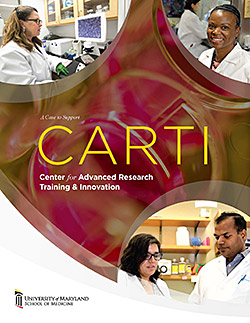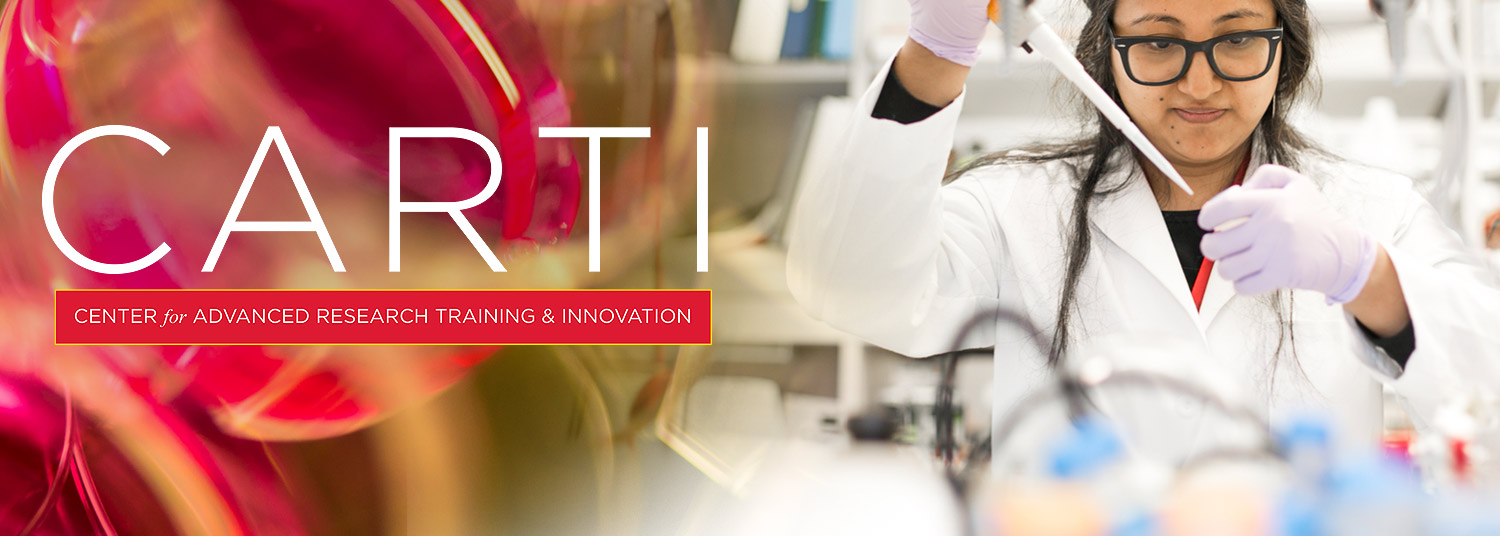 Biomedical research progresses along an innovation continuum—from discoveries in basic science laboratories to historic and transformational clinical outcomes.
Biomedical research progresses along an innovation continuum—from discoveries in basic science laboratories to historic and transformational clinical outcomes.
The University of Maryland School of Medicine (UMSOM) serves as the anchor for a large academic health center, which aims to provide the best medical education, conduct the most innovative biomedical research and provide the best patient care and community service to Maryland and beyond. Each day, our faculty are making the extraordinary possible.
The University of Maryland Center for Advanced Research Training and Innovation (CARTI) is the embodiment of our enduring commitment to advance novel discovery paths that will improve human health.
CARTI is a centralized hub for robust formal advanced biomedical research training, mentorship, and professional development — inspiring, growing and developing the next generation
of scientists who will advance high-impact research and discovery. This investment in faculty research can yield pioneering discovery-driven treatments that provide new hope for patients.
You can be a catalyst for discovery and innovation.
Learn how your philanthropic investment can support CARTI
For more information contact:
Kim Morton, Associate Dean for Development
kmorton@som.umaryland.edu | 410-706-3901
These are just a few examples of innovations and discoveries made by UMSOM faculty clinician-scientists:
CAR T-Cell Therapy Provides New Hope for Cancer Patients
Ten percent of all diagnosed cancers in the United States are blood cancers and they can be deadly. UMSOM faculty research has led to innovative cancer treatments the novel use of CAR T-Cell Immunotherapy and is one the first few centers in the U.S. to use these gene therapies. This cutting-edge technology, which uses the body's own immune cells to fight cancer, is giving new hope to people with Non-Hodgkin's Lymphoma, B-Cell Leukemia, and Myeloma…and it’s just the beginning.
Also, read more In the News >
Revolutionizing Patient Care with the First Portable Artificial Lung
Our faculty have developed a portable, artificial lung, which has the potential to revolutionize care for patients with respiratory failure. The device was issued FDA 510(k) clearance during the COVID-19 public health emergency, and the first patient in the world to use the device called Abiomed Breethe OXY-1 System™ was treated in December 2020 at University of Maryland Medical Center. It is currently being used for others with acute respiratory distress syndrome, including patients with COVID-19 and trauma-related conditions.
World’s First Pig Heart to Human Xenotransplant
In a first-of-its-kind surgery, a 57-year-old patient with terminal heart disease received a successful transplant of a genetically-modified pig heart in January 2022. The patient, David Bennett, Sr., lived two months after this groundbreaking surgery leaving a legacy of hope to millions of Americans needing transplants as advancements in xenotransplantation continue.
MRI-Guided Focused Ultrasound to Treat Essential Tremor and Parkinson’s
MRI-guided focused ultrasound (FUS) is a non-invasive technique that uses sound wave energy to ablate cells within the body. Our ground-breaking clinical trials have led to FDA approval of this nonsurgical treatment option for key motor symptoms of advanced Parkinson’s disease. Kimberly Spletter was one of the first patients in the U.S. to receive FUS to relieve debilitating symptoms from her Parkinson’s medication.

